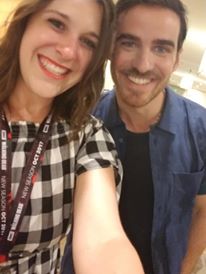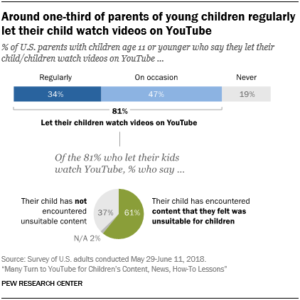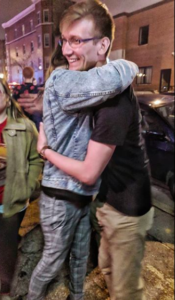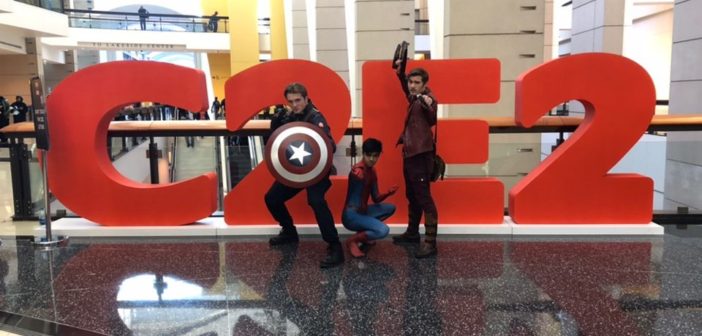You’re too old to care about comic books.
Chill out, they don’t even know who you are.
You’re not a real film fan because you’ve never watched “Citizen Kane.”
Quit being such a fangirl.
Whether or not someone is a self-described “fangirl,” everyone has their own interests or passions that drive them to be fanatical. From every facet of popular culture to the quirkiest, most niche things, people, places and things are celebrated across various fandoms. This ranges anywhere from casual enjoyment to extreme dedication that borders on obsession.
It is the latter that often turns people away from identifying as part of a fandom. These people are written off or stereotyped as crazy fangirls, or as popularized by the Eminem song, “stans.” Described as being “synonymous with hardcore fans of a celebrity” by the Huffington Post‘s Mat Whitehead, this term captures the essence of what people dislike about many fandoms.
The hardcore dedication to an artist, musician, sports team or influencer may be fulfilling for the individual, but how does it impact their personal life? Their social life? What about the idol’s personal or social life? Fandom is a complicated subculture, and reasons for being involved in these communities vary, but there appears to be a common thread linking individuals and fandom:
A natural human desire for connection.
Before you conjure up the image of a lonely teenager behind their computer screen or an older person glued to game shows all day, it is important to note that this is not the case. Michael Blight, assistant professor of communication, explains that people are drawn to these fandoms and connections for a number of reasons.
This evolution that Blight points to is partly the result of the participatory culture of social media. Whether it be through joining fandoms on websites like Tumblr, interacting with celebrities on Instagram, or utilizing a hashtag to live tweet a TV show, social media has the power to connect fans with their idols as well as to one another to create communities of people with similar interests.
Before delving into specific fandoms, social media usage and the ins-and-outs of this phenomenon, it is worth noting the distinction between fans and fan culture. According to Sociology Research, fans are “individuals who have a particular liking or affection” while fan culture involves “(taking) part in socially organized fan activities” such as conventions, posting to message boards or attending live events.
With more than half of adults and nearly 90% of young adults using social, according to Pew Research Center, it is not surprising that fandoms have seemingly blown up on social media. While this offers many positives, it also puts users with differing opinions at risk of being attacked by a larger group of fans or even just receiving unexpected feedback on a post.
Fans and fan culture vary from person to person, where devotion is shown in a variety of ways including sounding off on stan Twitter, crafting a cosplay costume, and following bands on tour.
Once upon a time…
“I’ve always liked writing and I’ve always liked TV shows, so it was kind of like ‘where can I express these reactions I have to a TV show?’”
Freelance entertainment journalist Madeline Klepec was no stranger to participatory fan culture prior to reporting for organizations like Hollywood News Source and Pure Fandom, though she quickly found a favorite TV show through her work.
A fairytale with a modern twist, ABC’s “Once Upon a Time” was a successful fantasy drama that ran from 2011 to 2018. Klepec was asked to cover a convention on the show in Chicago a few years ago and quickly binge-watched the series to be prepared for the event.

With Colin O’Donoghue from OUAT. Photo courtesy of Klepec.
As a freelance entertainment journalist for online pop culture websites, Klepec has covered various shows and movies. However, her obsession with “Once Upon a Time” is unrivaled. What started out as press coverage at a convention turned into Klepec interviewing members of the cast several years later at San Diego Comic Con.
“I’m just a college student from small-town Illinois and then I go to California and I’m meeting these people who play my favorite characters on the screen,” she said. “It was really weird because I didn’t want to get starstruck — I wanted to stay professional — but at the same time you’re like, ‘I watch this show, I obviously love it!'”
Beyond meeting celebrities, Klepec has also made friends through her work as well as at conventions.
“It’s cool, you just meet so many different people who share the same passion for TV shows,” she said. “It may seem weird, but it’s just kind of something that’s hard to explain, they just get you.
“I don’t think I could’ve met or talked to some of the people that I’ve talked to without the help of social media because I’ve gotten some of my freelance work just from word of mouth on social media so without that, you can’t connect to that community unless you actively look for it or actively go to comic cons or fan conventions or any of those things.”
As much as this sounds like a fairy tale, Klepec has also questioned whether or not she was “too old” to be a fangirl.
Despite the back-and-forth, she knows that at the end of the day, people are looking for something that they can get lost in.
“I see a lot of people on Twitter like, ‘I love this because something like this happened to me’ … You kind of grasp onto that, where it’s like ‘oh, that’s how I felt in a particular moment’ and I think that’s why people tend to gravitate toward TV shows,” Klepec said.
“It’s kind of an escape from real life so when you’re stressing out over finals or you had a bad day at work or whatever the case may be, you just turn on the TV and it’s like nothing happened, it’s kind of just an escape.”
Viewing the Vlog Squad
“I think I’m on my phone like four hours a day … which seems a lot longer than I think I’m on it.”
With YouTube quickly becoming one of the most frequented social media platforms among young adults, it is not surprising to see the rise in popularity of influencers. According to Pew Research Center, 73% of U.S. adults and 90% of 18- to 24-year-olds use YouTube.

Graphic courtesy of Pew Research Center
Courtney Kurhayez, ’21, is both a fan of and has done research on popular YouTuber David Dobrik, who currently has 12 million subscribers. Dobrik and his friends, known as the Vlog Squad, are among the platform’s most popular content creators and have amassed a larger-than-life fanbase.
With this fanbase, the sense of community comes from the “direct line of contact” because of how intimate YouTube videos tend to be. “You feel like you’re a part of the group,” said Kurhayez. “You’re going through the day with your favorite content creator.”
While this connection lends itself well to getting consistent viewers, it can also be damaging for creators. The intimacy of someone recording parts of their day, fictionalized or not, can create a one-sided relationship for the viewers. In some cases, this even goes as far as breaking the screen barrier and interacting with the creator in real life despite having no real relationship with them.
“I know that what happens a lot with David and his friends is that people will come up to them on the street and they feel like they know them because that’s kind of the purpose of the videos,” she said. “But it’s like, they don’t know them at all.”
“It just creates a sometimes weird dynamic where people will say jokes they made in the vlog — David makes fun of everyone — but if a stranger comes up to Jason (Nash) and says, ‘oh, you’re old,’ it’s not funny,” she said. “Obviously if you’re a fan it’s like you think you know these people and then you go to meet them and they have no idea who you are.”
Cosplaying at C2E2
“I have been going to C2E2 since I was like 12.”

Photo courtesy of Szpytek.
Chicago Comic & Entertainment Expo is an annual convention where pop culture comes to life for a weekend every April. Peter Hunt Szpytek, ’20, is one of many who wear cosplay.
“When I was a kid I always really wanted to (go in costume) but I never really knew how and so me and my siblings would just put together a costume in whatever ways we could, the same way you put a costume together when it’s Halloween and it’s like ‘well what do we have around the house?'” he said.
This April, Szpytek and some friends decided to dress up as Marvel characters and create their own costumes. This is a tradition many others who attend conventions partake in; the atmosphere of the event is very much that of a comic book brought to life.
To create the perfect cosplay, the work extends far beyond just buying a full costume set for a character. Szpytek dyed a pair of green jeans red by filling his kitchen sink with red dye to achieve the right look.
C2E2 itself, he explained, had a welcoming environment in which fans were gathered together to celebrate mutual interests. Part of this comes from the cosplaying aspect of the convention.
8123 means everything to me
“They are easily the best live band I have ever seen. They are so good live that it sort of ruins other live experiences.”
Driving hours on end to see his favorite band, The Maine, Aaron Field has been following their music for years. From high school to college, their music has been a big part of his life. While he does not track their every move on social media as some fans may do, he does recognize that these platforms can be a helpful tool for fans.
“Easier access to information, more high-quality pictures of a concert or hints about drop-dates or meet-ups are all beneficial to fans,” he said. However, this can be a challenge for the creator. “It really is a double-edged sword; social media can destroy you in the blink of an eye.”

Photo courtesy of Field.
While this has not been an issue for The Maine specifically, it is not uncommon to see fans “cancel” certain people or celebrities online in response to something they have said or done. This goes back to what Blight discussed earlier, where fans tend to put certain pressure or projections onto celebrities and react poorly when they find out their image was false — especially via social media.
This constant connectivity between fans and creators has shifted the relational dynamic for both better and worse. “Social media gives a creator the ability to spread your music to more people, quicker and easier,” said Field. “You can gain a following in almost no time if what you make is popular.”
The popularity of The Maine’s music, as well as the band’s bond with their fanbase, is a large reason why they have such a massive following. The fans, considered a part of the 8123 family, have such a unique bond that many struggle to describe what it means to them.
“The answer is so hard to form with words,” said Field. “Being a fan of The Maine is finding time, even when you’re overwhelmingly busy, to go to a show. Being a fan of theirs is really a good time, watching them develop their music and how each album is different but somehow still incredible. Being a fan of theirs is eye-opening and is one of the best things that has happened to me.”
“You haven’t watched that movie?!”
“’How could you possibly study film and not have seen this?’”
Despite most films being made to appeal to as many people as possible, there is still something within them that fans cling to as though it was made just for them. How can so many people watch something and feel it, in a way, belongs to them?
“I think there’s this question of identification. Something that we convince ourselves is somehow made for us, even against the odds of that possibility,” said Chelsey Crawford, professor of film and screen studies. “It’s a mass medium designed for as many people as possible. Yet, something about these characters seems so personal to us because while they’re a piece of mass media they’re also a piece of art that someone wrote coming from a particular place.”
The human element behind the characters or stories can make for a strong or interesting film, but it can also be the reason why people become devoted to following a director, actor or, perhaps most commonly, a franchise. The viewer becomes a part of the story in their mind and this may lead to gatekeeping, or controlling access to or establishing rules for something that is otherwise public and accessible.
“When you get really dedicated to a fandom or a fanbase, you almost feel like a sense of ownership and the belief that you might know it better than, let’s say, a staff writer who has not been a diligent religious reader of a series,” said Crawford.
The illusion of ownership is especially prevalent among Star Wars fans, who are notoriously critical of any move in the franchise. With “The Force Awakens” and “The Last Jedi,” for example, some fans were bothered by the inclusivity and what some viewed as giving in to political correctness. With the latter film, actress Kelly Marie Tran was attacked for her character’s role in the film as well as for her own participation in the film.
While fans of this franchise present many issues to unpack, it partially comes down to the fact that they believe they should have a say in what goes on in the films. The same mindset also translates to some students and scholars Crawford has interacted with.
“There’s a lot of hierarchy in the Academy, in the cinephilic community and then within those the subgroups of communities of people who prioritize certain things,” said Crawford. “I cannot even explain how many people are frustrated with me that I have not seen more of these Marvel movies or that I don’t know more about Marvel.”
What drives fan culture?
Despite the differences among each of these fandoms, a desire to feel connected to or to be a part of something bigger than oneself is present. Whether it be through television, music, vlogs, conventions or film screenings, there is a human element beyond the shiny pop cultural exterior for fans to attach themselves to.
Social media highlights the prevalence of fan culture, as it is a vehicle to connect fans with their idols and to unite communities of people. The relationships developed here are relatively new given the rising popularity of these platforms over recent years, so it is difficult to say just where they will continue to go.
The only guarantee here is that fan culture will never go away; fandom may change forms as time goes on, but the unique connection that exists within these communities is difficult to replace.

